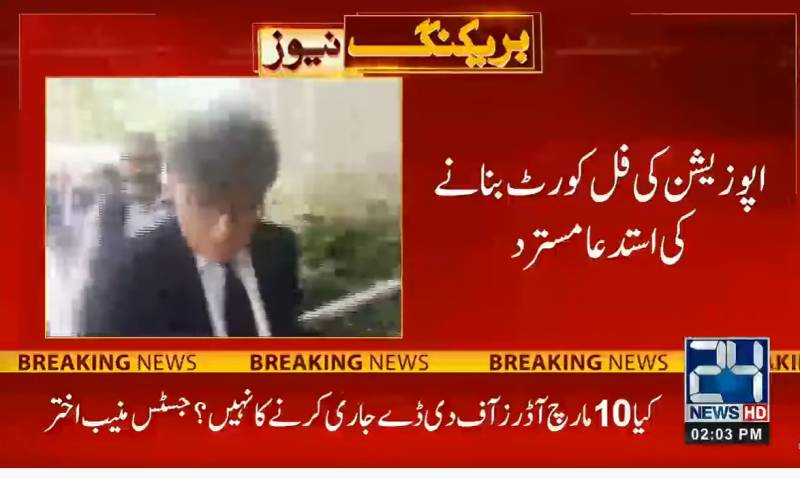Suspense continues as SC weighs on deputy speaker’s ruling
SC holds hearing on suo motu notice of present constitutional crisis: Dismisses PPP plea for formation of full-court bench: CJP wants details of parliamentary committee on national security meeting: Justice Muneeb believes NA deputy speaker not authorized to give such ruling: Hearing adjourned till tomorrow on PPP lawyer’s request

Stay tuned with 24 News HD Android App

The Supreme Court has put off hearing of its suo motu notice on the constitutional crisis arising out of National Assembly deputy speaker’s ruling on Sunday who dismissed the opposition’s no-trust move; and the subsequent dissolution of the assembly by President Arif Alvi on the advice of Prime Minister Imran Khan, reported 24NewsHD TV channel.
Chief Justice of Pakistan Umar Ata Bandial, who took suo motu notice of the situation and released a short order yesterday directing all government functionaries to refrain from taking any unconstitutional measure/step, said earlier on Monday that he would issue some kind of ‘reasonable order’ today. But on the request of PPP lawyer Farooq H Naik, the CJP adjourned the hearing till tomorrow.
During the hearing, Justice Muneeb Akhtar remarked that he believed that as per the rules the deputy speaker could only run the house during the absence of the NA speaker but he did not have the jurisdiction to give such kind of ruling.
While debating on determining the validity of no-trust resolution, the CJP asked on which stage the speaker could ascertain the validity. Naik replied that he could ascertain the validity of the resolution only on the violation of Article 95.
The lawyer said that Article 95 does not mention regarding levelling any charge or allegation against prime minister. He argued it was not necessary to give any reason for no-confidence vote. The same procedure of no-confidence move against premier applies to the no-trust move against speaker, he added.
The CJP remarked that the SC would determine the constitutionality of what happened in the National Assembly.
Justice Muneeb asked what would happen if the National Assembly speaker did not allow tabling the no-confidence resolution. But, the PPP lawyer, said the speaker had allowed the no-trust resolution on March 28 and prorogued the house till April 3 for holding a voting on it.
Naik said that the NA deputy speaker declared all MNAs ‘traitors’ by levelling an allegation that they were part of an international conspiracy.
CJP Bandial remarked that he condemned this act of NA Deputy Speaker Qasim Suri.
The PPP lawyer said that deputy speaker’s ruling was illegal.
Justice Muneeb remarked that according to the rules, the deputy speaker could only run the house during the absence of the NA speaker but he believed that the deputy speaker did not have the jurisdiction to give such ruling.
Naik said that Fawad Ch who took the floor of the assembly on April 3 during question-answer session, the house could have debated on Fawad Ch’s point of order.
On this, Justice Muneeb said that it might be a procedural mistake not to hold a debate on the question of Fawad Ch.
Naik said it was not a procedural issue.
The CJP further asked the lawyer what did he think that the deputy speaker had no grounds to dismiss the resolution and his action was mala fide.
Naik said that the speaker could in no way declare that the no-confidence resolution was based on mala fide intention.
CJP Bandial remarked that the speaker relied on Article 5 to invoke his ruling.
Naik said that even after invoking Article 5, no-trust move could not be dismissed.
The CJP asked the lawyer to cite court judgements in support of his point.
On this, the PPP lawyer sought more time for giving more arguments which was granted by the justice.
The chief justice, however, also remarked that in his ruling the deputy speaker also mentioned about the meeting of Parliamentary Committee on National Security in which the opposition did not take part deliberately. This matter (international conspiracy) was put before the committee, the CJP said adding that this question should be answered by all the opposition parties.
At the outset of the hearing, the Supreme Court rejected Pakistan Peoples Party’s plea to form a full-court bench for the hearing of the case.
Chief Justice of Pakistan Umar Ata Bandial had taken suo motu notice of the situation on Sunday and initially formed three-judge bench of the apex court comprising besides him Justice Ijazul Ahsan and Justice Mohammad Ali Mazhar.
Today the CJP formed a five-judge larger bench headed by CJP Bandial and consists of Justice Ijazul Ahsan, Justice Mazhar Alam Mian Khel, Justice Muneeb Akhtar and Justice Jamal Khan Mandokhel. However, Justice Muhammad Ali Mazhar was no longer part of the larger bench.
During the hearing, PPP lawyer Farooq H Naik requested the court to form a full bench of the court to hear the case. But his plea irked CJP Bandial who remarked why he was so anxious. He said the court knew fully well what question was more important before it. While telling the PPP lawyer off, the CJP said if (the lawyer) had any objection over the bench, then the judges would leave. He said if he formed full bench, it would affect other cases.
The justice said that last year, 63 hearings were held by full court benches and it led to an increase of 10,000 unheard cases.
On this, Farooq Naik said that he had full confidence in the bench.
The CJP rejected the PPP plea to form a full court bench.
While giving his arguments, PTI lawyer Babar Awan said that main issue was early elections. So we are ready for it, he added.
This annoyed Chief Justice Bandial who told Awan that it was a political statement. He said that the court released a short order yesterday and it would issue some reasonable order today.
Reporter Waqas Azeem
